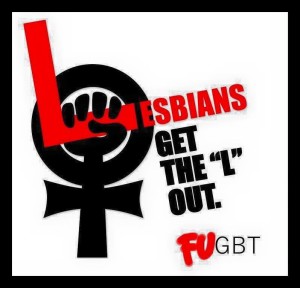It is important for Pagan and Goddess groups to become more aware of and responsive to the ways Lesbians are alienated and marginalized within the spiritual community. Lesbian erasure is rampant in literature, organizations, and events that purport to be “LGBT friendly.” In fact, sometimes acknowledging or making an outreach to the “LGBT” ends up directly alienating lesbians, making enemies where there were none before.
Erasure is different from inclusion. When there is lack of inclusion of a minority group, they are simply not there. Lack of inclusion may be a problem or it may not be, since every group does not purport to serve everyone. Erasure means that a significant number of people are participating in a group at a high level, but everyone pretends they’re not there. Erasure of women is a problem in virtually any group that is not women only. Erasure of lesbians can be a problem even in women only groups.
It’s important for straight women to know that having a gay male friend you would do anything for does not mean lesbians will assume that you are on their side. Many straight women have gay male friends while maintaining distance from women they describe as “unfeminine,” “angry,” “too radical,” or some other adjective which is really an oblique way of saying “lesbian.” Maintaining that “of course I can’t be homophobic against lesbians, I have these great gay male friends” is naïve at best and offensive at worst.

What does this mean for spiritual groups that are not expressly LGBT? It means don’t point to a policy statement or endorsement from an LGBT group and expect it to hold favor with lesbians – or worse, invalidate what a lesbian has to say by pointing to an LGBT advocacy group. If anything, invoking the LGBT makes you look tone deaf and out of touch. The initials LGBT, much used by advocacy groups and in the media, do not mean that the people these initials represent have a great deal in common. There are even some under each of these letters who say this alliance needs to break up. So writing a few lines about transgender women in a book about Goddess spirituality will not be seen as acknowledging the significant participation of lesbians in this area. Giving an award to a gay man will not be seen as bestowing recognition on lesbians.
It would behoove straight women to listen more to lesbians and seek lesbian opinions on “LGBT” issues. Don’t assume that the left media on the internet is doing this. Listen to lesbians talk about their spirituality and their relationship with the Goddess and what they seek in spiritual community. Above all, acknowledge lesbians are in the Pagan/Goddess/feminist communities in significant numbers. And that we want them here.
